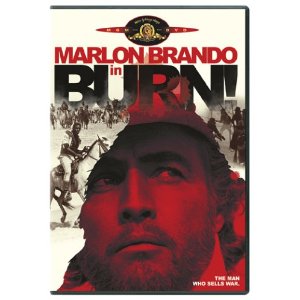Movies |
Burn
directed by Gillo Pontecorvo
By
Published: Jun 03, 2020
Category:
Drama
Of his films, which one did Marlon Brando prize above all others?
No. Not “The Godfather.” “Burn.”
You haven’t seen “Burn” — indeed, you may never have heard of it — because:
1) It was made in 1970, before many of you were born.
2) It’s an action movie/political thriller about colonialism. It was released in this country at the height of the Vietnam war. Its subject: economic and racial exploitation. The New York Times didn’t review it; an enthusiastic appreciation had to wait until 2004. Why? Its American distributor raced to get it out of the theaters.
3) For donkey’s years, there was only a sucky VHS tape.
Why you should see this movie:
1) It’s Gillo Pontecorvo’s follow-up to Battle of Algiers a film about colonialism and terrorism so evergreen that the Pentagon screened it before we invaded Iraq.
2) Unlike “Battle of Algiers” — made in black-and-white and shot to look like a documentary — “Burn” is a big-screen epic, set in an exotic location, shot in color.
3) Ennio Morricone’s soundtrack could be his greatest ever. If you’ve ever heard the Missa Luba, imagine it on steroids. Or just watch the opening credits of “Burn.”
4) Marlon Brando.
5) History you’ve seen nowhere else. t’s the true story of Sir William Walker, sent by Britain to start a revolution in the Lesser Antilles in 1844, A decade later, Britain sends him back — to put it down
6) It is so exciting — I mean intellectually exciting, emotionally exciting, even, dare I say, spiritually exciting — that you’ll never forget it, never stop quoting from it, never stop arguing with it.
Enough shilling. (To buy the way-too-expensive DVD from Amazon, click here. To rent the download from Amazon, click here. To buy the download from Amazon, click here.]
What’s “Burn” about? In Portuguese, “burn” is “quiemada.” (In the film, it’s the name of a fictional Caribbean Island; in Europe, it was also the movie’s title.) In the 1600s, the “natives” rebelled. The Portuguese response: burn the sugar fields and kill thousands, then bring over slaves from Africa. (In many ways, this is the story of Haiti and the 1790s uprising led by Toussaint-Louverture.)
The movie starts in the early 1800s. The slaves are restless. The sugar they harvest is a big cash crop. A splendid time for the English to stir up more trouble — and move the Portuguese out.
Sir William Walker” — Marlon Brando — is the British agent. (Feel free to see him as a CIA operative.) He’s a fop in a lavender scarf, flask of whiskey never out of reach. Cynical? Cold? He finds a slave named José Dolores (played by Evaristo Márquez, a non-actor who had, in fact, never seen a movie) and convinces him to lead a revolt. It succeeds. But no way are the ex-slaves capable of governing — “Who will buy your sugar, José?" — so Brando encourages them to let the English run things.
More slavery or “freedom” — that’s the first big decision for Queimada. After the Portuguese have been expelled, Brando makes the case for “freedom” to the white leaders.
Sir William Walker: Gentlemen, let me ask you a question. Now, my metaphor may seem a trifle impertinent, but I think it’s very much to the point. Which do you prefer — or should I say, which do you find more convenient: a wife, or one of these mulatto girls? No, no, please don’t misunderstand: I am talking strictly in terms of economics. What is the cost of the product? What is the product yield? The product, in this case, being love — uh, purely physical love, since sentiments obviously play no part in economics.
[general laughter]
Sir William Walker: Quite. Now, a wife must be provided with a home, with food, with dresses, with medical attention, etc, etc. You’re obliged to keep her a whole lifetime even when she’s grown old and perhaps a trifle unproductive. And then, of course, if you have the bad luck to survive her, you have to pay for the funeral!
[general laughter]
Sir William Walker: It’s true, isn’t it? Gentlemen, I know it’s amusing, but those are the facts, aren’t they? Now with a prostitute, on the other hand, it’s quite a different matter, isn’t it? You see, there’s no need to lodge her or feed her, certainly no need to dress her or to bury her, thank God. She’s yours only when you need her, you pay her only for that service, and you pay her by the hour! Which, gentlemen, is more important — and more convenient: a slave or a paid worker?
Rather brilliant, don’t you think? And it comes to pass: England manages a “free” Queimada. And Brando goes back to England.
Jump ahead twelve years. José Dolores has come to understand how little has changed for his people. Now he’s a rebel leader, commander of an ever-growing insurrectionary militia.
Time for Brando to return to Queimada and put down the man he befriended and mentored. And time for me to say no more. You’ll quickly understand what you’re watching. And why.


